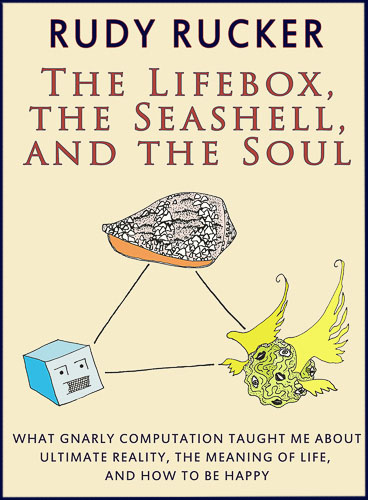 The Lifebox, the Seashell, and the Soul
The Lifebox, the Seashell, and the Soul
Rudy Rucker.
1st Edition: Thunder's Mouth / Avalon, October, 2005.
2nd Edition: Transreal Books, November, 2016.
460 pp, 148 illustrations, drawings by Isabel Rucker.
Paperback The Lifebox, the Seashell, and the Soul. Amazon
Ebook The Lifebox, the Seashell, and the Soul. Amazon— Other Sellers
Reviews — Media— Software — Notes— About Rudy
Browse the Book Online
Browse the new edition as a webpage with live links. (Or view a PDF of the old edition.)
Summary
The book has a long subtitle that summarizes what’s ahead: What Gnarly Computation Taught Me About
Ultimate Reality, The Meaning of Life,
And How to Be Happy.
What if everything is a computation?
Does this mean that the world is dull? Far from it. The naturally occurring computations that surround us are richly complex. A tree's growth, the changes in the weather, the flow of daily news, a person's ever-changing moods — all of these computations share the crucial property of being gnarly. Although lawlike and deterministic, gnarly computations are — and this is a key point — inherently unpredictable.
We live, in other words, amid splendor beyond our control.
Who would will it otherwise?
Reviews
"Rudy Rucker is an outstanding prophet of what will probably be the greatest intellectual revolution of our times. This book tells the ever-surprising story of his transformation as he discovers the wonders of the computational universe, and grapples with their implications for humanity's oldest questions. For people who thrive on new ideas, this book will be a classic."
— Stephen Wolfram, author of A New Kind of Science.
"This is the Big Book I wish everyone would do. Audacious and simply inimitable. You are inside Rudy Rucker by the end. Nobody takes the late-night idea that the universe is a computer as seriously (or with as much fun) as this book does. What I love about it: it's part biography, part far-out science fiction speculation, part best course-in-computation-ever-taught, part romp through the intellectual frontiers of mathematics and philosophy, part sage wisdom, part blog, part graduate student thesis, part genius. What it might become: a new Gödel, Escher, Rucker."
— Kevin Kelly, Wired editor, author of Fast, Cheap and Out of Control.
With the soul of a poet and the insight of a logician, Rudy Rucker dramatizes the story of one of the most transforming ideas in modern science: that of computation. Interpreting the notion oh so broadly, Rucker calls on his impressive background in computer science and science fiction to clarify, amplify, and vivify a whole complex of seminal concepts. And the book's fun to read too!
— John Allen Paulos, author of Innumeracy and Once Upon a Number
How did a universe composed of just a few kinds of absolutely identical particles, starting from a state of almost complete uniformity, evolve in an ever ascending chain of complexity to produce galaxies, stars, planets, life, intelligence, and culture? In this fascinating book, Rudy Rucker explores how structures in nature, human consciousness, and society may actually be computations, showing how extremely simple computer programs manifest complex emergent behavior which mimics natural phenomena, suggesting that computer science may become part of the foundation of the sciences of the twenty-first century.
— John Walker, co-founder of Autodesk, Inc.
In this immense and ambitious work, former computer science professor Rucker speculates that life is a computation. He offers examples of everyday activities that are computational processes — speech, agriculture, hunting — as well as instances of computations found in nature and attempts to model those computations using cellular automata. The "lifebox" in the title is a digital copy of a person's memory that would be hyperlinked and "give a reasonably good impression of having a conversation with you." Though Rucker ultimately sees the world as beyond computation, he convincingly argues that the computational view can shed perspective on reality.
— Library Journal
A key debate of the computer revolution concerns Stephen Wolfram's argument that everything is equivalent to computation... Rucker modifies Wolfram's basic premises to apply to everyday experience — ending with a half-dozen practical rules for attaining happiness. Charmingly written and thought-provoking.
— Kirkus Reviews
Lifebox is valuable in the same way a wide-ranging philosophical classic like The Republic is valuable. To read it is to peer through a conceptual lens with its own unique focal length — an act that allows us to see the world in a way we never glimpsed it before. ... Rucker's stylistic approach, featuring bite-size sci-fi stories that illustrate
his points, is so innovative that even non-techies will find themselves enjoying
the ride.
— San Francisco Chronicle
Audio & Video
I have a number of lectures on the book available online as podcasts, plus a couple of videos and even some written essays. For the audio, go to the archive for Rudy's Podcasts, and scroll down to the episodes from #1 to #30 or so. For video go to Rudy's YouTube channel. And here are two of the video selections.
May, 2007. "What is Gnarl?". Playful art video I made at Big Sur.
November 24, 2011. Video of TedX talk in Brussels, "Beyond Machines: The Year 3000."
 The Lifebox, the Seashell, and the Soul
The Lifebox, the Seashell, and the Soul